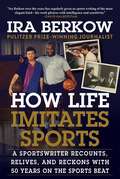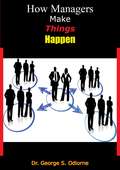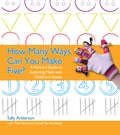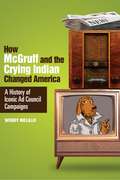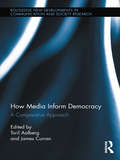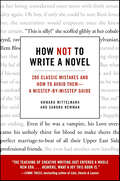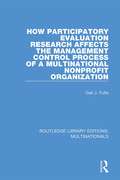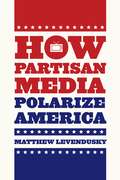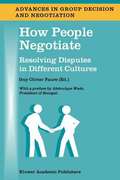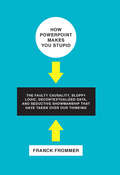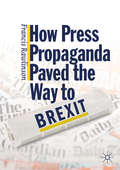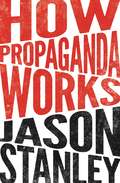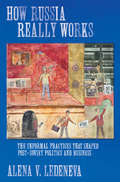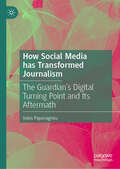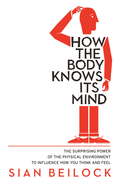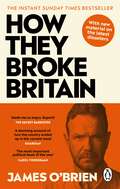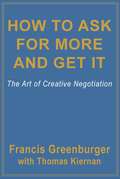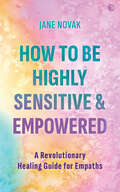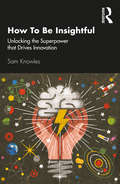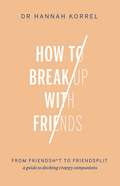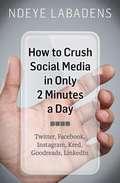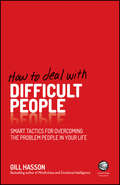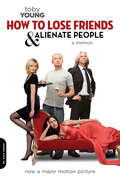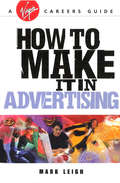- Table View
- List View
How Life Imitates Sports: A Sportswriter Recounts, Relives, and Reckons with 50 Years on the Sports Beat
by Ira BerkowMemorable Stories From a Half Century of Sports Journalism For the last half century, Pulitzer Prize–winning sportswriter Ira Berkow has been at the center of some of the most memorable moments in sports history. From the World Series, NBA Finals, and Super Bowl, to Heavyweight Title Fights, the Olympics, and The Masters, he has seen and covered them all. After fifty years covering sports, with more than twenty-five as a journalist for the New York Times, How Life Imitates Sports shares how these events—and their participants—have significantly shaped how we as a nation have come to understand and perceive our culture (and even our politics). They are a historical record of one significant sphere of our life and times: sports. From Muhammad Ali to Mike Tyson, Michael Jordan to LeBron James, Jackie Robinson to Derek Jeter, Billie Jean King to Tonya Harding, O. J. Simpson to Tiger Woods and beyond, this collection is a historical record of our times over this past half century, in terms of society, race and gender, politics, legal issues, and the fabric of our sports passions and human condition, ranging from pathos to humor, from introspection to perception. Including additional commentary on when these events first occurred and how they have impacted us today, Berkow shares the knowledge of someone who sat ringside, in the press box, and on the sidelines for some of the most notable moments in our history. So whether you&’re a fan of baseball and basketball, or tennis and soccer, How Life Imitates Sports shows you our history from someone who witnessed it first-hand; a worthy collection for anyone who appreciates the highest quality sports journalism.
How Managers Make Things Happen
by Dr George S. OdiorneHow can a manager control business situations to make them work for, rather than against him?Dropping the “soft approach to human relations,” the author of this book, first published in 1961, strikes out for compelling leadership. He teaches managers how to make things happen and get things done. He reveals methods not usually discussed in “how to” books, and seldom taught in the schools of business.Dr. Odiorne’s ideas have been called “fresh and striking,” and his concepts of the executive as a manager of situations have been labeled “valid and provocative.”His incidents, as depicted herein, are carbon copies of those actually existing in business today. And it has been said that Odiorne accurately molds the type of manager “I would like to work for.”Gain fuller cooperation, sharpen training, and generate greater productivity with these compelling tactics that spark subordinates to action and get things done.
How Many Ways Can You Make Five?: A Parent's Guide to Exploring Math with Children's Books
by The Vermont Center for the Book Sally AndersonUse your child’s favorite books to explore and investigate the world of mathematics! In a world filled with patterns, shapes, sequences, and numbers – math is all around us. From an early age, children begin to notice and make connections between math concepts and everyday life, asking: How many? How high? How long? and How much does that weigh?Children’s books can bring math concepts to life. With the help of the stories and activities in How Many Ways Can You Make Five? you and your child will have a blast reading about, talking about, and exploring the world of math. Use favorite children’s books to investigate patterns and puzzles, learn how to subtract, and make maps.With four chapters that cover a multitude of themes, it’s never been easier to deepen your child’s understanding of important math and reading concepts at the same time!
How McGruff and the Crying Indian Changed America: A History of Iconic Ad Council Campaigns
by Wendy MelilloHow McGruff and the Crying Indian Changed America: A History of Iconic Ad Council Campaigns details how public service advertising campaigns became part of our national conversation and changed us as a society. The Ad Council began during World War II as a propaganda arm of President Roosevelt's administration to preserve its business interests. Happily for the ad industry, it was a double play: the government got top-notch work; the industry got an insider relationship that proved useful when warding off regulation. From Rosie the Riveter to Smokey Bear to McGruff the Crime Dog, How McGruff and the Crying Indian Changed America explores the issues and campaigns that have been paramount to the nation's collective memory and looks at challenges facing public service campaigns in the current media environment.
How Media Inform Democracy: A Comparative Approach (Routledge New Developments in Communication and Society Research)
by James Curran Toril AalbergIn this timely book, leading researchers consider how media inform democracy in six countries – the United States, the United Kingdom, Belgium, the Netherlands, Norway, and Sweden. Taking as their starting point the idea that citizens need to be briefed adequately with a full and intelligent coverage of public affairs so that they can make responsible, informed choices rather than act out of ignorance and misinformation, contributors use a comparative approach to examine the way in which the shifting media landscape is affecting and informing the democratic process across the globe. In particular, they ask: Can a comparative approach provide us with new answers to the question of how media inform democracy? Has increased commercialization made media systems more similar and affected equally the character of news and public knowledge throughout the USA and Europe? Is soft news and misinformation predominantly related to an American exceptionalism, based on the market domination of its media and marginalized public broadcaster? This study combines a content analysis of press and television news with representative surveys in six nations. It makes an indispensable contribution to debates about media and democracy, and about changes in media systems. It is especially useful for media theory, comparative media, and political communication courses.
How Not to Write a Novel: 200 Classic Mistakes and How to Avoid Them—A Misstep-by-Misstep Guide
by Howard Mittelmark Sandra Newman"What do you think of my fiction book writing?" the aspiring novelist extorted. "Darn," the editor hectored, in turn. "I can not publish your novel! It is full of what we in the business call 'really awful writing.'" "But how shall I absolve this dilemma? I have already read every tome available on how to write well and get published!" The writer tossed his head about, wildly."It might help," opined the blonde editor, helpfully, "to ponder how NOT to write a novel, so you might avoid the very thing!"Many writing books offer sound advice on how to write well. This is not one of those books. On the contrary, this is a collection of terrible, awkward, and laughably unreadable excerpts that will teach you what to avoid—at all costs—if you ever want your novel published. In How Not to Write a Novel, authors Howard Mittelmark and Sandra Newman distill their 30 years combined experience in teaching, editing, writing, and reviewing fiction to bring you real advice from the other side of the query letter. Rather than telling you how or what to write, they identify the 200 most common mistakes unconsciously made by writers and teach you to recognize, avoid, and amend them. With hilarious "mis-examples" to demonstrate each manuscript-mangling error, they'll help you troubleshoot your beginnings and endings, bad guys, love interests, style, jokes, perspective, voice, and more. As funny as it is useful, this essential how-NOT-to guide will help you get your manuscript out of the slush pile and into the bookstore.
How Participatory Evaluation Research Affects the Management Control Process of a Multinational Nonprofit Organization (Routledge Library Editions: Multinationals)
by Gail J. FultsThis title, first published in 1993, addresses two questions: can evaluation research function as a surrogate market in non-profit organisations to measure, value, and assess the goods and services they provide? And second, can the findings from an evaluation process be incorporated as a service accomplishment element into the accounting information published by non-profit organisations? This title will be of interest to students of business studies.
How Partisan Media Polarize America
by Matthew LevenduskyForty years ago, viewers who wanted to watch the news could only choose from among the major broadcast networks, all of which presented the same news without any particular point of view. Today we have a much broader array of choices, including cable channels offering a partisan take. With partisan programs gaining in popularity, some argue that they are polarizing American politics, while others counter that only a tiny portion of the population watches such programs and that their viewers tend to already hold similar beliefs. <P><P> In How Partisan Media Polarize America, Matthew Levendusky confirms--but also qualifies--both of these claims. Drawing on experiments and survey data, he shows that Americans who watch partisan programming do become more certain of their beliefs and less willing to weigh the merits of opposing views or to compromise. And while only a small segment of the American population watches partisan media programs, those who do tend to be more politically engaged, and their effects on national politics are therefore far-reaching. <P>< In a time when politics seem doomed to partisan discord, How Partisan Media Polarize America offers a much-needed clarification of the role partisan media might play.
How Partisan Media Polarize America (Chicago Studies In American Politics Ser.)
by Matthew LevenduskyForty years ago, viewers who wanted to watch the news could only choose from among the major broadcast networks, all of which presented the same news without any particular point of view. Today we have a much broader array of choices, including cable channels offering a partisan take. With partisan programs gaining in popularity, some argue that they are polarizing American politics, while others counter that only a tiny portion of the population watches such programs and that their viewers tend to already hold similar beliefs. In How Partisan Media Polarize America, Matthew Levendusky confirms—but also qualifies—both of these claims. Drawing on experiments and survey data, he shows that Americans who watch partisan programming do become more certain of their beliefs and less willing to weigh the merits of opposing views or to compromise. And while only a small segment of the American population watches partisan media programs, those who do tend to be more politically engaged, and their effects on national politics are therefore far-reaching. In a time when politics seem doomed to partisan discord, How Partisan Media Polarize America offers a much-needed clarification of the role partisan media might play.
How People Negotiate: Resolving Disputes In Different Cultures (Advances In Group Decision And Negotiation #1)
by Guy Olivier FaureHow People Negotiate brings together a set of negotiation stories, accompanied by an integrative overview. This volume provides cases and theoretical elaboration and includes a comprehensive overview of research on negotiation. Some negotiation stories are exotic and strange: they come from a large number of countries, ranging from China, to African Countries, to the Ancient Middle East. Others are drawn from Western settings such as France, Germany, and USA. The negotiations described take various forms: negotiating with oneself, negotiating one's own way through bicycle traffic or animals appearing to negotiate with each other. The stories begin with Abraham negotiating with the Lord about the fate of Sodom, the first-ever recorded account of negotiations. The negotiations in this volume present something new and unusual. They are catchy, intriguing, exciting, intellectually challenging and original. They give us a new perspective on negotiating, tell us something about the world we live in, and - by means of a worthwhile detour - they teach us about ourselves.
How PowerPoint Makes You Stupid
by George Holoch Franck FrommerWith over 500 million users worldwide, Microsoft's PowerPoint software has become the ubiquitous tool for nearly all forms of public presentation-in schools, government agencies, the military, and, of course, offices everywhere. In this revealing and powerfully argued book, author Franck Frommer shows us that PowerPoint's celebrated ease and efficiency actually mask a profoundly disturbing but little-understood transformation in human communication.Using fascinating examples (including the most famous PowerPoint presentation of all: Colin Powell's indictment of Iraq before the United Nations), Frommer systematically deconstructs the slides, bulleted lists, and flashy graphics we all now take for granted. He shows how PowerPoint has promoted a new, slippery "grammar," where faulty causality, sloppy logic, decontextualized data, and seductive showmanship have replaced the traditional tools of persuasion and argument.How PowerPoint Makes You Stupid includes a fascinating mini-history of PowerPoint's emergence, as well as a sobering and surprising account of its reach into the most unsuspecting nooks of work, life, and education. For anyone concerned with the corruption of language, the dumbing-down of society, or the unchecked expansion of "efficiency" in our culture, here is a book that will become a rallying cry for turning the tide.
How Press Propaganda Paved the Way to Brexit
by Francis RawlinsonThis book traces how right-wing newspapers in Britain helped shape British public opinion about the European Union over the course of the 20 years preceding the EU referendum in June 2016. The author argues that newspapers such as the Telegraph, Mail, Sun and Express have been effectively waging a long-term propaganda war, with the distortions and borderline fake news presented one of the factors that helped secure the narrow majority for Brexit. Written by an EU insider, the book presents hard facts and debunks the core myths on EU laws, exorbitant budget contributions and uncontrolled immigration, and contributes to the broader debate on the importance of the press for democracy.
How Propaganda Works
by Jason StanleyOur democracy today is fraught with political campaigns, lobbyists, liberal media, and Fox News commentators, all using language to influence the way we think and reason about public issues. Even so, many of us believe that propaganda and manipulation aren't problems for us--not in the way they were for the totalitarian societies of the mid-twentieth century. In How Propaganda Works, Jason Stanley demonstrates that more attention needs to be paid. He examines how propaganda operates subtly, how it undermines democracy--particularly the ideals of democratic deliberation and equality--and how it has damaged democracies of the past.Focusing on the shortcomings of liberal democratic states, Stanley provides a historically grounded introduction to democratic political theory as a window into the misuse of democratic vocabulary for propaganda's selfish purposes. He lays out historical examples, such as the restructuring of the US public school system at the turn of the twentieth century, to explore how the language of democracy is sometimes used to mask an undemocratic reality. Drawing from a range of sources, including feminist theory, critical race theory, epistemology, formal semantics, educational theory, and social and cognitive psychology, he explains how the manipulative and hypocritical declaration of flawed beliefs and ideologies arises from and perpetuates inequalities in society, such as the racial injustices that commonly occur in the United States. How Propaganda Works shows that an understanding of propaganda and its mechanisms is essential for the preservation and protection of liberal democracies everywhere.
How Russia Really Works: The Informal Practices That Shaped Post-Soviet Politics and Business (Culture and Society after Socialism)
by Alena V. LedenevaDuring the Soviet era, blat--the use of personal networks for obtaining goods and services in short supply and for circumventing formal procedures--was necessary to compensate for the inefficiencies of socialism. The collapse of the Soviet Union produced a new generation of informal practices. In How Russia Really Works, Alena V. Ledeneva explores practices in politics, business, media, and the legal sphere in Russia in the 1990s--from the hiring of firms to create negative publicity about one's competitors, to inventing novel schemes of tax evasion and engaging in "alternative" techniques of contract and law enforcement. Ledeneva discovers ingenuity, wit, and vigor in these activities and argues that they simultaneously support and subvert formal institutions. They enable corporations, the media, politicians, and businessmen to operate in the post-Soviet labyrinth of legal and practical constraints but consistently undermine the spirit, if not the letter, of the law. The "know-how" Ledeneva describes in this book continues to operate today and is crucial to understanding contemporary Russia.
How Social Media has Transformed Journalism: The Guardian’s Digital Turning Point and Its Aftermath
by Vaios PapanagnouThis book explores the influence of social media on the transformation of institutional journalism. Grounded on a case study of The Guardian in the UK, the work is an in-depth look at how a leading news organisation navigated the challenges of the social media era. Drawing on interviews with Guardian journalists, Papanagnou demonstrates that the major change that social media effected on journalism has been the inculcation of journalists with the logic of branding. Journalists now actively brand themselves and their organisations as authoritative voices on public affairs; they emphasise their expertise in the stories they share across platforms, leveraging their reputations to establish credibility and connect with like-minded audiences. Ultimately, the author argues that the turn to branding represents a pragmatic solution to the problem that social media companies posed for journalism. By embracing networking technologies, journalists and their organisations have become increasingly tethered to big-tech. And, lacking the immense technological and financial resources of the digital platforms, news brands and their journalists have sought to counteract this dependency by wielding the power of their journalistic reputations.
How The Body Knows Its Mind: The Surprising Power Of The Physical Environment To Influence How You Think And Feel
by Sian BeilockIf you've ever gestured wildly with your hands in order to coax a word from your memory, or if you've sat up straighter in a meeting to feel more confident and alert, then you already know some of the ways the body can make an impact on the mind. But what if that's just the tip of the iceberg? Recent research shows that the extent to which the body affects the brain is greater than we'd ever imagined. Now How the Body Knows Its Mind reveals extraordinary ways you can use your body to improve your mind and performance in all areas of life.We often think of the brain as the master control centre - interpreting experiences, deciding what to do, and pulling the levers of the body. Sian Beilock, a leading expert on the brain science behind human performance and professor in the psychology department at the University of Chicago, turns our understanding of the mind upside down in How the Body Knows Its Mind.Your brain doesn't make that much of a distinction between what happens in your body and what happens in your mind. In fact, our bodies actually hack our brains. The way we move affects our thoughts, our decisions, and our preferences, and kids absorb more when they use their bodies as a learning tool. Called "embodied cognition," this new science illuminates the power of the body and its physical surroundings to shape how we think, feel, and behave: pacing around the room can enhance creativity; walking in nature boosts concentration skills; Botox users experience less depression; fit children score higher on tests in school.From the tricks used by advertisers to the ways body language can improve your memory to how to master public speaking, Beilock explains a wealth of fascinating interconnections between mind and body and shows how mastering them can make you happier, safer, and more successful.
How They Broke Britain: The Instant Sunday Times Bestseller
by James O'Brien***THE RUNAWAY BESTSELLER, WITH NEW MATERIAL FOR THE PAPERBACK***THE REVEALING, DEFINING ACCOUNT OF THE DARK NETWORK THAT BROKE OUR COUNTRY.Something has gone really wrong in Britain.Our economy has tanked, our freedoms are shrinking, and social divisions are growing. Our politicians seem most interested in their own careers, and much of the media only make things worse. We are living in a country almost unrecognisable from the one that existed a decade ago. But whose fault is it really? Who broke Britain and how did they do it?Bold and incisive as ever, James O'Brien reveals the shady network of influence that has created a broken Britain of strikes, shortages and scandals. He maps the web connecting dark think tanks to Downing Street, the journalists involved in selling it to the public and the media bosses pushing their own agendas. Over ten chapters, each focusing on a particular person complicit in the downfall, James O'Brien reveals how a select few have conspired - sometimes by incompetence, sometimes by design - to bring Britain to its knees.
How To Ask For More and Get It
by Thomas Kiernan Francis Greenburger"How To Ask For More And Get It is not, as the title might suggest, a book for the greedy, pursuing compulsive and unrealistic dreams of acquiring more worldly wealth. Rather, it is designed to help the average person get his due in the thousands of exchanges, both mundane and important, that punctuate his or her life," says Francis Greenburger and Thomas Kiernan.All of us are confronted daily with countless exchanges, both ordinary and extraordinary, the outcomes of which largely define the quality of our lives. In fact, the Exchange is the single most frequent and important process of our interpersonal existence. Negotiation is the art of consistently turning these exchanges to one's advantage, and this book shows how to master this art.Using examples from real-life situations, the authors show you how to develop your basic negotiating skills--how to state your criteria, who makes the first move, what tactics to use, how to set your goals and establish a strategy--in short, how to win!Whether you are an employee bargaining for a raise, the tenant applying for a lease, the homeowner planning an expansion, the spouse settling a quarrel, a man with an attractive young lady in mind...whether you are the layman or the professional, this book will teach you how to make the most of the exchanges which touch every facet of your life."Imagine yourself in any of the following situations:You are about to walk into a realtor's office to make an offer on your dream house or to rent the apartment you've finally found after months of searching...You are about to sit down with your spouse's lawyer to discuss the financial terms of your impending divorce...Tomorrow you are to appear for you final interview with a company you feel sure will offer you the job you have been seeking, at which your salary and other benefits will be decided...You are about to sit down with an auditor from the IRS...The "bottom line" of such exchanges is that we either gain or lose by them, financially and otherwise. Motivated by our innate self-interest, we naturally hope to acquire more than we give away. More often than not, however, we end up losing more than we gain. Why? Because we do not know how to negotiate our needs, our rights, our hopes, and our wishes..."Francis Greenburger operates an extremely successful New York real estate business--a milieu in which the negotiator's art is severely tested and sharply honed. Recently, he expanded his interest to include the publishing world and now operates an equally successful literary agency--another pursuit in which negotiating is the key to success. This is his first book.Thomas Kiernan was an editor for many years. He is also the author of fourteen previous books.
How To Be Highly Sensitive and Empowered: A Revolutionary Healing Guide for Empaths
by Jane NovakA practical guide outlining how empaths can protect themselves from sensory overload and burnout. A step-by-step transformational journey of unlocking and reclaiming energy and power.Have you been told you are &“too sensitive&” or &“overly emotional&”? Being an empath can be an incredible gift of compassion and connection. When unchecked, empathic insights can leave people feeling depleted and overwhelmed. Sensitivity is a strength.How to Be Highly Sensitive and Empowered offers a healing roadmap, from Step 1 "Master energy awareness" to Step 7 "Activate and share your gift". Tools include breathing exercises; powerful visualizations; inner voice journaling; how to create "transition breaks" to overcome energy drains. How to Be Sensitive and Empowered outlines:How empaths differ from Highly Sensitive People, and how to reframe your emotional energy as deep wisdom. Ways to effectively set boundaries, with examples from Jane Novak's coaching programme, to find peace in a challenging world.A practical healing programme, tackling the inner work needed to transform how empaths relate to the wider world. This book helps empaths move from being in a state of turmoil to becoming comfortable in their skin and more confident in relationships and interactions. Discover the freedom empathy unlocks in all areas of life: leadership, creativity and love.
How To Be Insightful: Unlocking the Superpower that drives Innovation
by Sam KnowlesHow do we advance? As individuals, families, and businesses? As societies, nations, and a species? In a world where it’s said there is nothing new under the sun, we humans are remarkably resourceful at creating new things. The key to innovation is understanding, but not just by using facts, data, and casual observations. Progress demands the profound and useful understanding of a person or a thing, a situation or an issue. And profound and useful understanding that truly effects change is that most elusive of phenomena: insight. How To Be Insightful provides a novel and deeply practical framework that anyone can use to generate more powerful and impactful insights from the increasing volumes of data we all face every day, whatever we do. The framework – the STEP Prism of Insight – has been developed through decades of both practice and training, and the book includes many exercises designed to help strengthen and develop readers’ insight muscles. The book explains the history, psychology, and neuroscience of insight and includes snapshots of insight from international experts in many different fields – psychology and neuroscience, music and acting, forensic science and market research.
How To Break Up With Friends: From Friendshit to Friendsplit – a guide to ditching crappy companions
by Dr. Hannah KorrelWe all have that one friend. The one who expects the world, but never remembers your birthday. The one who constantly ditches your dinner plans when you&’re already halfway to the restaurant. The one who leaves you feeling exhausted, used and completely emotionally battered. Why do we let these people into our lives? When is their friendship actually friend-shit? How do we dump these crappy companions? This is the no-bullshit, essential guide for anyone devoting their precious time and energy into maintaining friendships with toxic friends. Using activities, truth bombs, and real-life examples, neuropscyhologist Dr Hannah Korrel will help you to identify the bad friends in your life, understand what true friendship should look like, learn how to attract the best people, and become the best friend you can be yourself. Provocative, funny, and brutally honest, How To Break Up With Friends will change the way you look at friendship forever.
How To Crush Social Media In Only 2 Minutes A Day: Twitter, Facebook, Instagram, Kred, Goodreads, Linkedin
by Ndeye Labadens James Goonwrite. ComPrepare to Crush the Game of Social Media! This is a fun and powerful method to promote your business, book, or item. Why Do You Need to Crush Social Network? This book offers step- by- step instructions to build your social media presence with your platforms and /or blog. You'll have access to multiple resources to help increase your sales and your online presence. For example, do you know the best keywords to use? When is the most beneficial time to use Twitter? How do you change listings on Goodreads? You'll find answers to these questions and many more. Prepare to Crush the Social Media in Only 2 Minutes a Day is a must-have!
How To Deal With Difficult People
by Gill HassonDON'T LET PROBLEM PEOPLE GET TO YOU!Whether it's a manager who keeps moving the goal posts, an uncooperative colleague, negative friend, or critical family member, some people are just plain hard to get along with.Often, your immediate response is to shrink or sulk, become defensive or attack. But there are smarter moves to make when dealing with difficult people. This book explains how to cope with a range of situations with difficult people and to focus on what you can change.This book will help you to:Understand what makes difficult people tick and how best to handle themLearn ways to confidently stand up to others and resist the urge to attack backDevelop strategies to calmly navigate emotionally-charged situationsDeal with all kinds of difficult people - hostile, manipulative and the impossibleKnow when to choose your battles, and when to walk awayWhy let someone else's bad attitude ruin your day? How to Deal With Difficult People arms you with all the tools and tactics you need to handle all kinds of people - to make your life less stressful and a great deal easier.
How To Lose Friends And Alienate People: A Memoir
by Toby YoungIn 1995 high-flying British journalist Toby Young left London for New York to become a contributing editor at Vanity Fair. Other Brits had taken Manhattan--Alistair Cooke, Tina Brown, Anna Wintour--so why couldn't he?But things didn't quite go according to plan. Within the space of two years he was fired from Vanity Fair, banned from the most fashionable bar in the city, and couldn't get a date for love or money. Even the local AA group wanted nothing to do with him.How to Lose Friends and Alienate People is Toby Young's hilarious and best-selling account of the five years he spent looking for love in all the wrong places and steadily working his way down the New York food chain, from glossy magazine editor to crash-test dummy for interactive sex toys. A seditious attack on the culture of celebrity from inside the belly of the beast, How to Lose Friends and Alienate People is also a "nastily funny read." --USA Today
How To Make It In Advertising
by Mark LeighAdvertising. Is it really 'the greatest art form of the twentieth century' (Marshall McLuhan)? Whatever your views, it is undeniably one of the most popular career choices going-and one of the most difficult to get into. If you want to be creative and make money, or simply fancy trying your handat a job in one of the most powerful industries around, then this indispensable guide is all you'll need to get a foot in the door and keep a step ahead of the competition. It's a careers guide with a difference, using the experience and wisdom of some of the industry's top people. You'll find essential advice on how to get started and how to get ahead, as well as the insider's view of the genuine pros and cons of each job, from copywriter to account handler. Your new career starts here.
